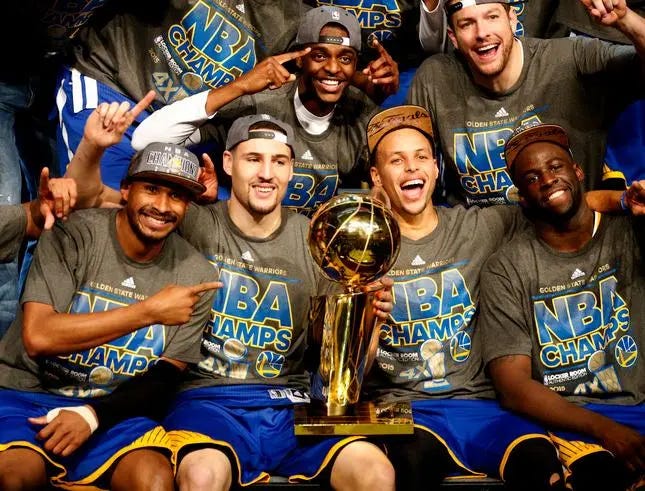All Hail the Homer
A homer is more likely to be correct about their team
One of my many claims to fame is that I was the lone ESPN writer to predict the Warriors’ 2014-2015 championship. Every now and again I’m asked how I did this, as though it was some great feat. The boring answer is that the hardest part was just pulling the trigger. Any idiot hanging around Kerr’s first preseason could see that the team was dramatically, remarkably better. Once you realized that the Warriors were a lock to have a top 5 offense and defense, you understood that they’d have the best title shot. Then it was simply a matter of making a call you knew would result in mockery, given that you were a local man picking the local team.
To quote myself, when making the call in October of 2014:
The assumption is that proximity skews perspective favorably, that to like something local is to exaggerate its place in the universe. That’s at least the assumption I jump to when I see Scott Brooks claiming Russell Westbrook as the best point guard, based solely on Brooks watching his player up close. There are advantages to watching something up close, though. You’re more inclined to notice things that aren’t on the “PTI” scroll just yet. The beginning of a trend is like an alarm: You’re more likely to hear it the closer you are to it.
One issue (of many) with Internet discourse is downstream of the field being so crowded with noise. Given the information inundation, it’s understandable that people seek shortcuts. If you can dismiss certain perspectives as biased, or coming from supposedly “bad faith” bad people, you can clear the field and feel a bit more sane. But of course, we all have biases and few of us are simply “bad.” The correct method for assessing an opinion is on the basis of its substance versus whether you believe the espouser to be motivated by certain feelings.
I’m reminded of HoS muse and Friend of Pod Nick Wright, the sports TV talker and unabashed Kansas City Chiefs fan. One of the main criticisms of Wright is that he’s such a Chiefs homer, and yes, you could reasonably express annoyance at how rivals to Patrick Mahomes and Andy Reid get slighted by him. That’s a different conversation from whether he’s wrong about his favorite team’s quality, though.
The Chiefs struggled on offense this season, which inspired many NFL pundits to question their chances of making another Super Bowl. Wright, who watches his team closely, was far more positive about their odds, given that Kansas City had compensated for its declining offense with a much improved defense.
Obviously Nick was, well, right. Similarly, I, someone who watches every San Francisco 49ers game, was correct early in the season when arguing for Niner quarterback Brock Purdy’s relative quality against Nick’s protestations. And yes, I’m taking that victory lap. In October I said Purdy’s a top 10 quarterback, which is a pretty modest claim when stacked against the result of first in QBR, first in passer rating, first in yards per play, and making it to the Super Bowl. I maintain my extreme contention that this quarterback of the league’s top passing offense is actually…good.
How did I arrive at my take? Well, homerism, in a way. I don’t mean that I got there by being blindly emotional about what I witnessed. I mean that I, like so many in this region, had an intense interest in the San Francisco 49ers, more so than most NFL pundits. Since I cared about the outcome, I invested time and energy into observation. I had the context for how good Purdy was versus Jimmy Garoppolo, who preceded him. A theoretically less biased observer just wouldn’t observe as much. There are too many teams, too many games, and again, too much noise to sift through.
So yes, a homer might be biased, obviously. Perhaps the homer is prone to wishcast, conflating the desired outcome with the probable outcome. I think we’ve all seen a homer fan get tilted about reffing, perceiving unfairness in situations where an objective observer might simply shrug.
But a homer is also more likely to understand their favorite team’s weaknesses, and to worry about those vulnerabilities. Throughout the season, the 49ers have occasionally carried a reputation beyond their quality. Certain issues have cropped up that were discussed more on the local level than what I saw reflected in national media conversations about the team.
The upshot is that interest in an outcome outcompetes apathy. The popular idea that the homer is more likely to be wrong? It’s backwards. The interested party is more likely to know. Yes, being close to a situation can color your perspective. That’s true. It’s also so that proximity can alert you to a trend. It’s hard, from any vantage, to separate signal from noise. It’s also a lot easier to hear an alarm when you’re close to it.




Counterpoint: There are people I interact with online who think Daniel Jones is good.
Of course, Wright also predicted that the Chiefs would blow out the Eagles and Bills at home in the regular season this year, based on the exact same logic, and yet....